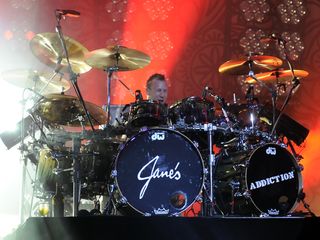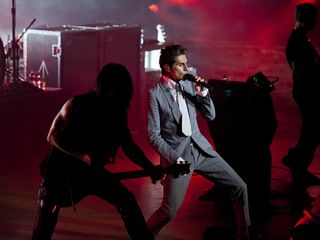
Drummer Stephen Perkins and the rest of Jane's Addiction "find the noise" on The Great Escape Artist. © Jared Milgrim/Corbis
"You have to be able to disagree about art," says Jane's Addiction drummer Stephen Perkins. "If I say the sky is blue but Dave Navarro says it's gray, then we have to be able to work something out. Not everybody in a band is always going to feel the same. But those differences of opinion can result in the best music. It's not always easy, but that's just the way it goes."
For Perkins, guitarist Navarro and singer Perry Farrell, "not always easy" has been the order of the day for most of Jane's Addiction's on-and-off, 26-year history. After releasing two hands-down classics, 1988's Nothing's Shocking and 1990's Ritual De Lo Habitual, the band sputtered to a messy, drug-fueled breakup in 1991.
Since then, Jane's Addiction have seen more than their share of drama, much of it centering on the revolving door of bass players who have played with the group since they started reuniting, breaking up and reuniting again in the late '90s. Despite the fluctuations in personnel (founding member Eric Avery quit in early 2010, Duff McKagan joined for half a year, TV On The Radio's Dave Sitek climbed on board for studio work, and now Chris Chaney is a touring bassist), the band has just issued The Great Escape Artist, an explosive return to form.
Stephen Perkins sat down with MusicRadar yesterday to discuss recording the new album, his thoughts on working with Duff McKagan, what Dave Sitek brought to the picture and how Chris Chaney is working out. In addition, we discussed jazz versus rock drumming, improvisation, hand percussion and...two-by-fours (as in lumber).
When we last spoke, you were just starting to work with Duff McKagan. A lot has changed since then.
[laughs] "That's true! Yeah, well, the interesting thing is, when I sit down with Perry and Navarro without a bass player - any bass player - it still sounds like Jane's Addiction. The nucleus that is the three of us, that's Jane's Addiction. We're like a little power trio.
"The Duff days were really cool because it was just about writing at first. Then he joined up to do some shows in Europe and in LA, which were a lot of fun. Going through the catalogue with him really helped us all understand how the rhythm section should work for the new record. Duff and I were definitely bonding at this point, no doubt.
"What ended up happening, though, was the music started getting tamed a little. We were sitting on a couch working on songs on bongos and a bass instead of being in a band setting. Sometimes I should be at my drum set. There's no substitute for turning up and making a nice noise, you know? It really affects the vitality of the music."

Perkins lays down the groove while improvising merrily. © Erik Ward/Retna Ltd./Corbis
What changed when Dave Sitek came into the picture?
"Actually, that was a great day for me. Dave was exactly what I needed to find that noise. The two of us got together for a few days without Navarro and Perry, and we got down to it. He brought basses, guitars, amps, turntables, drum machines - all kinds of stuff. I had my big Neil Peart drumset with me. It was cool. The two of us just made some noise! [laughs]
"Gradually, when it was Dave and the other Dave - Dave Navarro - I started to find something of a new sound. We did this without Perry, and I think that was the defining point of what the new record was going to be. It was time to experiment. It was time to get to know each other without worrying about the songs. We were just concentrating on playing."
Still, how did you feel about the work you had done with Duff?
"Well, it wasn't like we just wanted to throw it all away. We did pick and choose some of the tastier fruits from those sessions. Perry, Navarro and I were there during those times, so it wasn't like it was just Duff's music. We had to find what was applicable to the new record, which we did.
"The big thing was finding the noise and how far we could push it. Then, of course, once you add melody, lyrics and the topic, it all becomes a song. After that, we take it into the studio and have fun with all the audio toys. But before we got to that point with [producer] Rich Costey and Dave Sitek, it was about finding that sound, that noise, and in certain places Duff was very important."
After Duff left, was it weird to record the songs that he had written with you?
"No, not at all. Our recording sessions stretch on for months, so it's very different from other bands. We don't lay down a song and go, 'OK, cool. Now we'll start overdubbing.' Our songs take a long time to form. We cut things and talk about them, things change, and then we experiment a little - or a lot. [laughs]
"There's no set way. We find the tasty bits and keep them and figure things out. On this record, we have Dave Sitek on bass, Dave Navarro on bass, Chris Chaney is on bass - whatever makes the best song. So, no, it wasn't weird without Duff.
"For us, when we get in the studio, we need to find that focus or zone, which a band has to have. I mean, we can't ignore the sound of the old days, because it just comes out of us naturally. And our old sound is part of our identity, so why would we want to turn out backs on it?
"But it's about building something new. Dave Sitek and I… I mean, if you looked at our record collections, they'd be completely different. We both agree that the Bad Brains are the best punk band ever, but beyond that we're on completely different planets. He's got stuff I never even heard of! [laughs] On the other hand, Navarro and I will reference a Deep Purple song that Dave Sitek has never heard of."
OK, but talking about the focus, knowing that you've had a few different bassists lately, how do you as a drummer find that spot? It must be frustrating at times.
"Well, part of it is because, like I said, Perry and Navarro and I really do sound like Jane's. That's us and you can't remove it. But I know what you mean. You know, I'm very lucky to have played with some amazing bassists. Eric Avery, Flea, Mike Watt, Martyn [LeNoble], Duff, Chris Chaney - all incredible.
"I'm not a meat-and-potatoes kind of drummer. I don't have one trick up my sleeve. Basically, I'm a jazz drummer who plays rock. I might imply my part here or there, but at no time will a bass player have to say to me, 'What are you playing in this song?' Because what I'm playing is always different. I like to get that tribal pulse, you know? And once Navarro gets his guitar thing going, it sounds like Jane's Addiction."
You're really into hand drums and other forms of percussion. What kinds of flavors did you put on the new record?
"All kinds. You know, I try to imagine the whole thing while I'm recording my main drum parts. I'll be thinking, Less hi-hat, I'll put on some shaker. Or I'll think, Less cymbals, I'm going to add some marching cymbals. On any recording, there's only so many frequencies you can fill, so I try to put together a real interesting drum ensemble.
"I brought in all sorts of percussion: gongs, timpanis, Hapi drums, steel drums, shakers, marimbas, African drums… I even banged on some trash cans and hit some two-by-fours together. Whatever works."
Two-by-fours? That's pretty creative.
"You'd be surprised. The guys are really great about letting me run wild with all my ideas. I want to set the pulse, but I want to be a songwriter, as well. And the pulse I set is way different from other drummers; it's definitely something I think is my own. But I do want people to hear my drum parts and be able to know the songs. There's something amazing about coming up with a great pocket but having it be something that people can go, 'Dude, I know that tune. It's…so-and-so.'"
It's interesting that you mention that you don't play the same part twice. Dave Navarro stated in an interview recently that you never play a straight four-bar beat.
[laughs] "I don't! I don't really play straight beats, that's true. Like I said, I'm a jazz drummer. When I hear Elvin Jones and Art Blakey, I don't hear them playing repetitive parts. They're reacting to the other musicians or even their environment. When I was growing up, I couldn't play with jazz musicians - everybody was picking up guitars and forming rock bands. So that's where I had to go.
"In my heart, though, I love playing with a jazz mentality - something that's very lyrical and expressive. Even somebody like Mitch Mitchell -"

Perkins says Jane's Addiction, performing live in Los Angeles, October 2011, are "in a great place." © Paul R. Giunta/Corbis
Who was very free-form, a lead player in many ways.
"Yeah! See, you take Mitch or Charlie Watts or Keith Moon, and the great thing is, they took those Motown beats and brought more personality and lyricism to them. The pulse was there, but there was room for a jam, improvising."
How do you find go about drawing that line between laying down the groove and improvising?
[laughs] "Well, I am pretty lucky to be playing with a lot of the same guys for a number of years, so there is a secure feeling between us. We can reach one another's minds. With other musicians I've played with, they get lost sometimes. Sure, I improvise, but I'm not changing the actual time signature; I'm just changing where certain beats fall.
"Navarro and Perry know what I do, so they're grooving with me. This goes for Chris Chaney, too, who's been with the band for almost as long as Eric Avery was. So yeah, I have room to improvise and be creative, which is awesome."
Sounds like the general state of Jane's is good.
"Absolutely. Perry, Navarro and I are feeling it. Chris Chaney, too. He's amazing. He's played with us through the years, and when things went down and we needed somebody, I knew Chris was the guy. He's like John Entwistle. He's a very emotional player, but he also knows music theory.
"Musically, we're in a great place. In a way, that's why we keep breaking up when the friendships aren't there. If things aren't good between us, we're not going to get on a bus and tour just because there's 100 grand per week. It's not worth it.
"What we need is to play with people who are inspiring, and we have that in Jane's. We're all feeling it, and it's good. If it starts to get weird again, then we won't do it. We're not in it for the money, we're in it for the music and the friendships."



